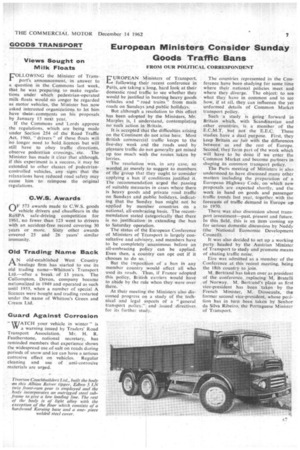European Ministers Consider Sunday Goods Traffic Bans
Page 9

If you've noticed an error in this article please click here to report it so we can fix it.
FROM OUR POLITICAL CORRESPONDENT
EUROPEAN Ministers of Transport. LA following' their recent conference in. Paris, are taking a long, hard look at their domestic road traffic to see whether they would be justified in banning heavy goods vehicles and "road trains" from main roads on Sundays and public holidays.
But although a resolution to this effect has been adopted by the Ministers, Mr. Marples is, I understand, contemplating no such action in Britain.
It is accepted that the difficulties arising on the Continent do not arise here. Most British commercial traffic keeps to the five-day week and the roads used by pleasure traffic do not generally get mixed up too much with the routes taken by lorries.
The resolution was, in any case, so worded as merely to suggest to members, of the group that they ought to consider applying a ban if conditions justified it. The recommendation urged the passing of suitable measures in cases where there is heavy goods and private road traffic on Sundays and public holidays, indicating that the Sunday ban might not be applied by member countries on a national, all-embracing basis. The recommendation stated categorically that there is no justification in extending the ban to Saturday operation.
The status of the European Conference of Ministers of Transport is largely consultative and advisory, and members have to be completely unanimous before an all-embracing policy can be applied. Even then, a couhtry can opt out if it chooses to do so.
But the imposition of a ban in any member country 'would affect all who used its roads. Thus, if France adopted this policy, British carriers would have to abide by the rule when they were over there. '
At their meeting the Ministers also discussed progress on a study of the technical and legal aspects of a " general transport policy." and issued directives for its further study. The countries represented in the Conference have been studying for some time where their, national policies meet and where they diverge. The object: to see what they have in common and to see how, if at all, they:can influence the yet unformed details of Common Market transport policy.
' Such 'a study is going' forward in Britain which, with Scandinavian and other countries, is a member. of the E.C,M1". .bit not the E.E.C. These studies have a dual purpose. First, they keep Britain ad fait with the differences between us. and the rest of Europe. Second, they form part of the work which will have to be done if we enter the Common Market and become partners in shaping its common transport policy.
The Paris meeting of Ministers is also understood.to have discussed many Other matters including the preparation of' a European Highway Code, on which new proposals are expected shortly, and the work in hand on goods and passenger traffic trends last year, together with the forecasts of traffic .demand in Europe up to 1970.
There was also discussionabout transport investment—past, present and future. In this field, this is an item coming up for serious domestic discussion by Neddy (the National Economic Development Council).
It was also decided to set up a working party headed by the Austrian Minister of Transport to study and promote means of abating traffic noise.
Eire was admitted as a member of the Conference at this recent meeting, being the 18th country to join.
M. Bertrand has taken over as president of the conference, .replacing M. Bratelli of ,Norway, M. Bertrand's 'place as first vice-president has been 'taken by the French Minister, M. Dusseaulx, the former second vice-president, whose po3ition has in turn been taken by Senhor da Silva Ribeiro, the Portuguese Minister of Transport.




















































































































